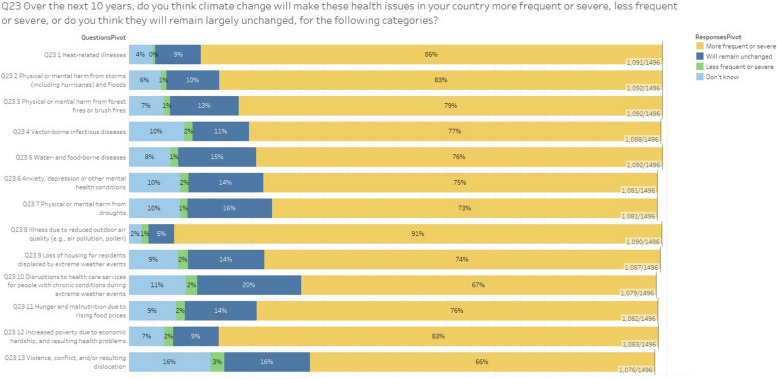Fig. 2.
The survey question, “Over the 10 next years, if at all, do you think climate change make these health issues in your contry more frequent or severe, or do you think they will remainlargely unchanged, for the following categories”? This bar chart presents public opinions on how climate change will impact various health issues over the next 10 years. Respondents were asked whether they think these health issues will become more frequent or severe, less frequent or severe, or remain largely unchanged. The health issues considered include heat-related illnesses, physical or mental harm from storms (including hurricanes) and floods, forest fires or brush fires, vector-borne infectious diseases, water- and food-borne diseases, anxiety, depression, or other mental health conditions, harm from droughts, illness due to reduced outdoor air quality, and loss of housing for residents displaced by extreme weather events. Additional categories include disruptions to healthcare services for people with chronic conditions during extreme weather events, hunger and malnutrition due to rising food prices, increased poverty due to economic hardship, and resulting health problems, and violence, conflict, and/or resulting dislocation. The chart categorizes responses into four groups: “More frequent or severe,” “Will remain unchanged,” “Less frequent or severe,” and “Don't know.” A significant majority of respondents believe that most of these health issues will become “More frequent or severe” due to climate change. For example, 91% expect illnesses due to reduced outdoor air quality to become more frequent or severe, while 86% believe the same for heat-related illnesses. Similarly, 83% of respondents anticipate that physical or mental harm from storms and floods will increase in frequency or severity. Other notable findings include 79% of respondents expecting more frequent or severe harm from forest fires, 77% for vector-borne infectious diseases, 76% for water- and food-borne diseases, and 75% for anxiety, depression, or other mental health conditions. The perception of increasing frequency or severity extends to physical or mental harm from droughts (73%), loss of housing due to extreme weather events (74%), disruptions to healthcare services (67%), and increased poverty and related health problems (83%). Overall, the chart reveals a widespread concern that climate change will exacerbate a wide range of health issues in the coming decade

